Automated license plate reader (ALPR) technology allows law enforcement officers to quickly recognize expired tags and identify and locate stolen vehicles. But it's also often instrumental in finding wanted and missing persons and solving a wide range of crimes, including homicides.
Automated license plate reader (ALPR) technology allows law enforcement officers to quickly recognize expired tags and identify and locate stolen vehicles. But it's also often instrumental in finding wanted and missing persons and solving a wide range of crimes, including homicides.
ALPR systems use cameras, either in fixed locations or mounted on vehicles, to capture and then analyze license plate characters and scan them against other plates stored in databases. It sure is easier and more efficient than an officer trying to read each plate number and accurately type it in by hand. But making the best use of this technology requires more than just flipping a switch.
Fixed and Mobile Cameras
Chief Rikki Goede of the Piedmont (Calif.) Police Department spearheaded the effort to find, acquire, and deploy ALPR cameras at her agency when she came onto the force a little over a year ago. Because she had experienced the benefits of the technology as a crime-fighting tool at her previous agency, it was one of the first things she set into motion as chief. And after talking to lots of companies and other agencies she learned a lot about the right way to approach it.
"I'm looking at using the fixed and mobile cameras together. A healthy combo of both is best," Goede says. Fixed cameras have helped her agency locate a missing Alzheimer's patient and track down offenders. But away from the major thoroughfares where cameras are placed, mobile cameras are a better bet.
"If a car doesn't go past the fixed camera, you don't get the plate," Goede says. "If you have a serious crime that just occurred, there are many times the crook will pass ALPR-equipped cars as they arrive on scene. The officer might not know it then, but he might see it later. That's how valuable they are from an investigative standpoint. "
For now, Piedmont PD officers take turns using one car equipped with ALPR on patrol, but Chief Goede knows more vehicles would capture more data, and she's working to add more mobile systems to the fleet. The department captures most of its license plate data from its fixed LPR cameras located at certain major intersections throughout the city, especially where people enter and exit the jurisdiction.
"To determine the positioning of our fixed cameras we worked with 3M Motor Vehicle Systems and Services, our public works director, and an engineer. Each camera needs an electricity source, so they're usually placed on a light pole," Goede says. Some citizens have complained about the placement, but mostly because they want more cameras to keep the city of Piedmont safe.
Internet connections to transmit the data are also important. Because Piedmont is located among hills, connectivity for some of the cameras has been spotty at times, but the chief says they've worked out those kinks.
Hot Lists and Alerts
Cameras capture data, but hotlists and alerts let officers know if a license plate number, or tag, fits under a certain category that might require special attention. And customizing these tools can help you more efficiently determine how to use that information while sitting in your car.
"In addition to the state or national databases, you can set up your own hotlist," says Officer Kevin Klein of the Clearwater (Fla.) Police Department, who uses PlateSmart's LPR solution. "Maybe you're looking for a specific license plate for an investigation but it doesn't meet the requirements to put it in the NCIC or state database. Maybe you want to interview someone in reference to a crime. You can put the tag in your own hotlist, and when it drives by, it will alert you."
You can also customize your alerts to emit different sounds based on importance. Instead of This audible cue helps Klein know without looking where he needs to focus his attention.
"When I get an alert of a passing vehicle, the alert will come up in front of whatever is on my screen and I can tell the priority without looking based on the sound," Klein says. "If the system makes a siren sound I'll know to look immediately at the screen to see the alert for the stolen car or the suspended driver or missing person. As opposed to a ding for an expired tag, which I know I don't need to focus on."
Detective Work
Because of budgetary issues the Cobb County (Ga.) Police Department had been limited to doing database searches using ALPR data captured by other law enforcement agencies in their area. Good detective work using this data has helped them solve major crimes, including a homicide.
Det. Sgt. L.J. "Ski" Szeniawski of the Cobb County PD Homicide Unit worked a case that depended on locating a victim's car after the person went missing using ALPR technology. He went to the location. Although the vehicle was no longer there, he viewed surveillance video of the area and identified two suspects who then confessed to murdering the man and dumping his body in the vehicle in an abandoned garage.
If ALPR could help them solve a homicide without their own systems, how many more crimes could they solve with immediate access to data? Now that Cobb County has more money in the budget, the department has recently purchased full ALPR systems from Vigilant Solutions, and officers are looking forward to reaping the benefits.
"The way it's been, somebody else reads a tag, it gets dumped in a database, and I check a few days later and find out what's happened in the past," says Szeniawski. "But now in real time, our officers will know it. Our own police cars will be capturing license plate data, and our own cars will be able to go take action."
However the data is acquired, Szeniawski says the captured information can help detectives like him establish not just the location of one suspect at a given time, but a larger picture of their whereabouts, which can be vital to an investigation.
"It's kind of like when we track someone based on cell phone tower information," Szeniawski says. "With the tag reader you can plot their locations and know where they've been because of when their car was seen. When you're talking about serial crimes, a specific location becomes important. If you can see they were near the crime scene, that's good information to have."
Training
Everyone who will be using ALPR technology can benefit from training, both initially and as time goes on. Training sessions are also a great opportunity to share best practices among users at an agency.
Trainers from 3M instructed everyone at the Piedmont Police Department in the use of its ALPR system, and the agency has held train-the-trainer courses to maintain officers' proficiency. Chief Goede says everyone knows how to use the agency's 3M ALPR system, but some are better at using it than others. She suggests identifying those officers who are keenly interested and or understand it well. "Have the ones with a knack for it do refresher training," Goede recommends.
And don't forget to train dispatchers, she advises. One Piedmont PD dispatcher effectively solved multiple crimes by a large theft ring by using LPR data. Two women reported a partial license plate and car description after a man stole their purses and phones. The dispatcher entered the information and pushed it out to officers. By that afternoon the vehicle was in custody, and in the next two days the suspects were in custody.
Klein will soon be in charge of training other officers to use mobile cameras as the Clearwater PD expands its LPR deployment. Because the PlateSmart system utilizes highly adjustable cars mounted inside the vehicle, part of his instruction will involve how to focus the camera lenses as well as where to position the cameras themselves when conducting traffic enforcement in different areas.
"You must have a basic knowledge of cameras," Klein says. "When people buy them, they think you just snap a photo. But the user must know what the capabilities are and how to use them to their advantage. For example, if you're on the shoulder of a six-lane highway, it can be tricky to capture the inside and outside lane. You have to zoom in and out, not leave the focus only at a certain distance. The system only works as well as the operator—the person in the car."
Making a Case for ALPR
If you're looking to add ALPR to your arsenal, or if you just want to make sure it will continue to get funded, it doesn't hurt to share how it's contributed to your agency's successes.
Cobb County's Szeniawski says when his team solved the homicide using ALPR, the captain who made the presentation to the board of commissioners specifically mentioned how important it had been. Shortly thereafter his department got the go-ahead to purchase new ALPR systems.
"For administrators, when you're going to the City Council and giving updates and the city has invested in an ALPR system, you better be prepared to tell them you're getting the bang for your buck. So I include graphs showing arrests and stolen vehicle recoveries on a quarterly basis," says Piedmont PD's Chief Goede.
It can also be helpful to make those in your community aware of the cases you've solved using ALPR. "I market the successes we've had with it, put it in the local paper," Goede says. "If the public understands how license plate recognition is being used, it helps appease their fears far more than anything."













